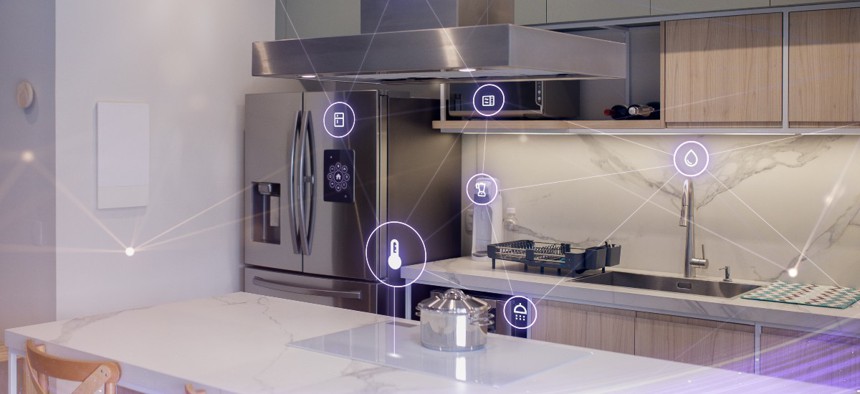Legislators Renew Efforts to Protect Consumers from an Eavesdropping Fridge

Capuski/Getty Images
The reintroduced bill asks the Federal Trade Commission to establish disclosure guidelines for smart devices and appliances that consumers would not expect to be recording them.
A bipartisan group of senators and representatives reintroduced the Informing Consumers about Smart Devices Act in both chambers of Congress on Wednesday, seeking to protect consumers from unwittingly being recorded from home smart devices that one may not think have such components, like refrigerators and air conditioners.
The bill—introduced in the Senate by Commerce, Science and Transportation Committee Chair Maria Cantwell, D-Wash., and incoming Ranking Member Ted Cruz, R-Texas—would require the Federal Trade Commission to develop reasonable disclosure guidelines for products that unexpectedly have audio or video recording components—such as microphones or cameras. Such devices could include refrigerators, dishwashers and toasters, as well as washers and dryers.
“By 2026, it’s estimated that over 84 million households will have smart devices—providing connection and control over everything from your air conditioning to your air fryer. Yet, most consumers expect their refrigerators to keep the milk cold, not come equipped with a camera or microphone to record their personal and private family discussions,” Cantwell said in a press release.
The lawmakers noted that consumers may not know or realize that an increasing number of household smart devices and appliances contain microphones or cameras that can record individuals and could have the capability to transmit this data over Wi-Fi.
“As the number of smart devices found in homes steadily climbs, consumers deserve greater transparency about how these devices work and how they impact privacy. Americans should know if the fridge is recording their families’ words and movements and they should know whether their virtual assistant is transmitting audio recordings of private family conversations,” Cruz said.
The legislation will not apply to technology that consumers would expect to record them, such as smart phones and laptops.
Reps. John Curtis, R-Utah, and Seth Moulton, D-Mass., introduced the House version of the legislation.
Curtis noted that the bill aims to protect consumers, “while also balancing flexibility for companies who are developing smart technologies,” adding that the act has received support from a wide coalition of consumer advocacy and technology companies.
“We should be allowed to make informed decisions about the electronic eavesdroppers we invite into our homes. But we can’t do it if big tech hides microphones and cameras that are always listening in refrigerators, toasters and other household gadgets. Let’s pass this bill so consumers know when big tech is listening in,” Moulton said.
The senators previously introduced the bill in November 2022, though ran out of time to get it through committee consideration. The legislation passed the House unanimously when it was introduced in the last Congress.






